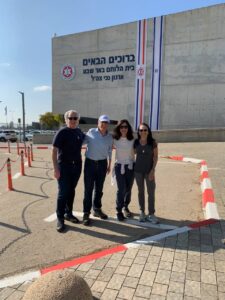
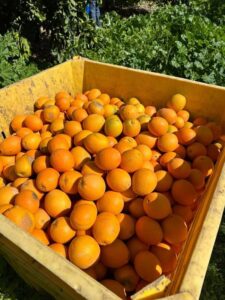
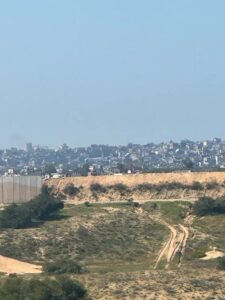
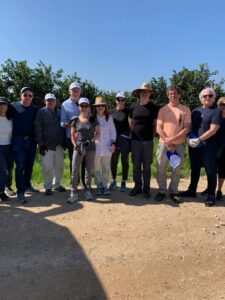
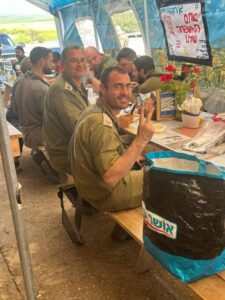
Hevre/Friends,
On Day 1 in Tel Aviv we met Ronen Avisrul, a longtime resident of Netiv Ha’asarah, a moshav less than one kilometer from the Gaza border which is now being occupied by the army. He shared his harrowing story from October 7 and his ongoing trauma which has prevented him from returning to his home, literally. His body refuses to go, he explained. This morning we went, and we carried Ronen with us in our hearts. There we met with two soldiers who were first responders to the brutal attacks at Netiv Ha’asarah, one of whom lived there with his family; his wife is the head of the moshav. Their stories were unvarnished and shocking and revealed many new insights for us. Standing on the access road to the moshav, we learned that the first people killed were the early morning runners and cyclists out for their daily workouts. Looking at places along the streets where people were savagely raped, mutilated and murdered, we learned that the terrorists were high on drugs they kept taking throughout the rampage in order to sustain their physical and sexual energy to cause the devastation they did. We learned that women and children were especially targeted given that they represent the future. We also learned that if a Muslim is killed by a female enemy soldier, they are not granted the status of a shahid/martyr. The soldiers expressed gratitude and support for the growing numbers of female combat soldiers in the IDF which can use that fact to the army’s tactical advantage. (Our security guard today was a young French Israeli female combat soldier named Noa!) We also learned of how some Israeli Muslims came out in support of the IDF, ashamed of the massacre and willing to help in ways that enabled the army to most effectively track and capture terrorists. While not universal, those stories need to be amplified. Standing on the lookout perimeter of the moshav with Gaza unimaginably close, one cannot comprehend the sheer terror of seeing paragliders sail over the moshav’s fences and land amidst their homes and gardens. It was a humbling and sobering visit.
From there we went to help pick oranges in nearby Moshav Shuva. If yesterday we were planting, today we were harvesting. While the citrus were plentiful, there were so many rotting from overexposure, not having been picked when they needed to be because of the labor shortage caused by the war. You can’t believe how many oranges 18 people can pick in an hour!
Just outside the gates of the moshav is a section of the street cordoned off and covered with a makeshift awning under which are tables and chairs providing shelter and rest for soldiers on their way in – and out – of Gaza. It was started by three brothers on October 7 to offer respite in the form of a hot drink and snack and a quiet place to sit to those working tirelessly to tend to the injured, collect the dead, and pursue the remaining terrorists. Almost five months later, the site has grown to accommodate hundreds of soldiers a day who pass through seeking a meal, a coffee, a chat, a massage, some music, or just some space to think – all at absolutely no charge. Volunteers from around the world come and stay a week or more offering kitchen skills, listening skills, and lots of hugs. We were lucky enough to meet brothers Eliran and Dror today. Eliran would accept no accolades for their work, saying, “This is Am Yisrael/the Jewish people. We just did what we had to do.” The most meaningful feedback he received, he shared, is when a soldier turned to him after a visit feeling refreshed and renewed and said, “This place helps us understand what we’re fighting for.”
In the afternoon we went to the beautiful facilities of Beit Halochem in Beer Sheva, a rehabilitation hospital for soldiers wounded in war and other victims of terrorist attacks. We met young, courageous, wounded veterans of the war in Gaza who shared their stories with us and showcased the advanced treatments and services Beit Halochem provides to heal their bodies. And they spoke about how the community at Beit Halochem – from the administrators to the physical therapists to the other wounded soldiers – provides endless comfort to heal their souls.
On the drive back to Tel Aviv, our learning focused on Jewish sources that help illuminate the crisis of the hostages. This is the most difficult and morally confounding element to every discussion of the war. And yet, it’s hardly a new phenomenon. Abraham waged a war to redeem his nephew Lot who’d been taken captive. Jacob’s daughter Dinah had been abducted and raped. Considered the most important priority when needed, Talmudic Sages and later authorities throughout the centuries tried to guide communities in the mitzvah of pidyon shevuyim/redeeming captives. Specifically, the sources struggle with the competing concerns for saving the lives of captives, not aggravating their suffering, and also not creating a climate that incentivizes the taking of Jewish hostages or puts the community at future risk. As the soldiers we met with earlier in the day noted, Hamas leaders have weaponized our Jewish sense of responsibility for one another and are using it with great effectiveness in this agonizing element of the war. Where our humanitarian values once served as an uplifting mark of Jewish pride, these days they weigh on hearts here with unfathomable heaviness.
Dini